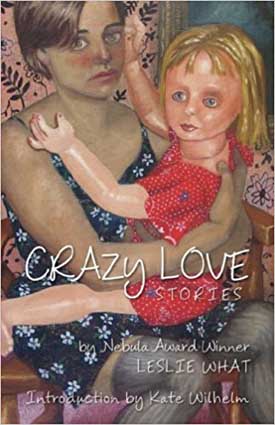 I first ran across Leslie What in the anthology Interfictions, edited by Delia Sherman and Theodora Goss. The story included there, the completely delightful “Post Hoc,” seems to be typical of What’s approach: place a character into a situation that might be stressful, but not really all that unusual, insert bizarre behavior, and treat it as perfectly normal.
I first ran across Leslie What in the anthology Interfictions, edited by Delia Sherman and Theodora Goss. The story included there, the completely delightful “Post Hoc,” seems to be typical of What’s approach: place a character into a situation that might be stressful, but not really all that unusual, insert bizarre behavior, and treat it as perfectly normal.
That might sound like a formula, but What’s stories don’t really seem to go in that direction. Offhand, I can’t think of anything farther from formulaic than these stories. There’s what I have to call a dadaist sensibility at work, but the sometime hilarity is only a veneer on much more serious concerns. These are stories about lonely people, fearful people, those who are emotionally numb, those who live with delusions, all masked as “love stories” gone slightly out of whack.
What takes our neurotic syndromes as a baseline. In “Picture a World Where All Men Are Named Harry,” for example, a real-life “Dating Game” in which all the participants are named Harry. The unnamed shopper — and it’s you, just ask the narrator — of course finds the real loser the most attractive, thinking you can somehow make it work, a delusion I suspect most of us have shared. What turns the phrase “dying for love” into a literal consequence of losing the game. In “The Mutable Borders of Love,” Marietta has survived the love of many men, simply by not admitting that she loves them, as she does with Asher, who joins the ghosts of her past — quite literally. There’s ample opportunity there for some pointed commentary on the human condition, and What seldom misses a beat, although she does sometimes round the points off a little.
She has a remarkable comedic gift that comes through as a strong thread of absurdism; she tends to turn reality on its head and poke it a time or two to see what happens. “The Cost of Doing Business,” for example, is a story about a professional victim. While not the most overtly humorous of the tales collected here, it does display What’s ability to take a common — albeit not terribly complimentary — phrase and build a reality on it while taking a hard look at what makes us do the things we do.
However, as much as I have enjoyed these little gems individually, I can’t recommend taking them in other than small doses. She lost me somewhere along the line. Maybe it was “All My Children.” Henry, the narrator, earned some extra cash in college by becoming a sperm donor. Now he’s faced with a family reunion with his 10,000 children — plus the two he fathered the old-fashioned way. That one just stretched my suspension of disbelief to the breaking point. And as I progressed through this volume, I began to get a sense of the stories becoming a little strained and starting to verge on the precious, and while any given story might be acerbic, even pungent, they somehow lost their edge in the aggregate. I’m willing to grant that it may just be a case of reviewer’s overload, but looking back, I don’t see any reason to change my opinion. So read them, but do it over several sittings.
(Wordcraft of Oregon, 2008)
